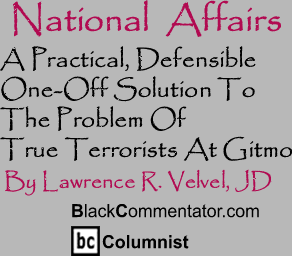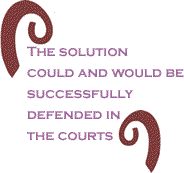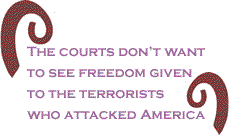
|
|||||||||||||||||||||||

|
|

Custom Search
|
|
 |
|
Early on, it
was made plain here, on five occasions from May through July of
2004, that the reason the Bush administration wanted to use military
tribunals to try prisoners was that evidence against them had been
obtained by torture and therefore could not be used against them
in federal courts. At the time, this was completely unrecognized,
and not even covered, by the news media. Subsequently, of course,
the point became widely known and, indeed, conceded. (These commentaries
were are reprinted in Blogs
From the Liberal Standpoint: 2004-2005 Now, because of the failure of military tribunals, the new Obama administration will be faced with a major problem: what to do about longstanding detainees who were responsible for 9/11 or other horrors. It is widely assumed that, as was said here four and one-half years ago, the detainees cannot be successfully tried because, as was said here in 2004 and is now long conceded, the evidence against them is deeply tainted by torture. On the other hand, they surely cannot be set free. So, how to proceed? There is a simple answer that, once again, as almost always true of the MSM, has not been considered by the media. It turns on the reason why the Supreme Court initially decreed in 1961 that evidence obtained illegally cannot be used in court to prosecute a person - a rule now so deeply embedded in the public and professional psyches that the original reasons for it tend to be forgotten or ignored.
Well, as you have likely guessed since you know about the long prevailing corruption of our criminal justice system now so powerfully exemplified by the Bush administration, the idea that civil suits, internal police discipline or even prosecutions would stop police misconduct was simply hopeless. Police station beatings and illegal seizure of evidence continued apace. So finally the Supreme Court had to say that, to stop this police misconduct, evidence that was seized unlawfully would be inadmissible at trial, would be excluded at trial. There would then be no point in beating the evidence out of suspects, or seizing it illegally, because if such conduct were shown, the evidence would be inadmissible for purposes of a prosecution - it would be “excluded.” This ruling in Mapp, called the exclusionary rule, was absolutely necessary at the time - and afterwards, too, because police misconduct did not wholly stop, so a rule making it self defeating continued to be essential. But, because of the rule’s origin, there has long been a debate over whether the exclusionary rule is constitutional in nature or merely preventive in nature (i.e., is only to prevent violations of the Constitution), and, correlatively, over whether it can be altered by Congress or otherwise suffer inroads. Passing the details of the debate, however - or perhaps “deliberately ignoring” them would be a more apt phrase - the origins of the exclusionary rule provide an answer to the question of how to deal with those prisoners at Guantanamo who simply cannot be set free, but must instead be tried and punished if found guilty (actually, when found guilty, not if found guilty, because of overwhelming proof of their culpability).
It likely would also be helpful, though perhaps not essential, if, in recognition of the horrible nature of the Bush administration’s misconduct in torturing people into confessions, a horrible character made even worse because so many FBI and other criminal investigation types were able to get pertinent information through normal techniques of interrogation before they were shoved aside by the torturers, the penalty was restricted to life in prison without parole, instead of being death, for terrorists found guilty (as they will be) due to evidence obtained wholly or partly through torture. This
solution could be adopted by the new Obama administration whether
by itself or in conjunction with an appropriate congressional law
or resolution. The solution, one is sure, could and would be successfully
defended in the courts. The courts don’t want to see freedom given
to the terrorists who attacked
It
also is likely to be quite acceptable to foreign governments which
have been deeply upset with
The
short of the matter is that the one-off solution - allowing unlawfully
obtained evidence to be used because of the dreadful situation we
find ourselves in due to years of BlackCommentator.com
Columnist, |
|
Any BlackCommentator.com article may be re-printed so long as it is re-printed in its entirety and full credit given to the author and www.BlackCommentator.com. If the re-print is on the Internet we additionally request a link back to the original piece on our Website. Your comments are always welcome. eMail re-print notice
If you send us an eMail message we may publish all or part of it, unless you tell us it is not for publication. You may also request that we withhold your name. Thank you very much for your readership. |
|
| |
|
| Novmber 13, 2008 Issue 299 |
|
| Executive Editor: Bill Fletcher, Jr. |
| Managing Editor: Nancy Littlefield |
| Publisher: Peter Gamble |
| Est. April 5, 2002 |
Printer Friendly Version
in resizeable plain
text format or pdf
format. |
| Frequently Asked Questions |
 |

|
 |
 |
 |
| |
| |





























 Before
the Supreme Court’s 1961 ruling (in Mapp v. Ohio), evidence
obtained illegally was admissible in court if it seemed to be reliable.
To stop the cops from obtaining evidence illegally, as by beating
prisoners with the proverbial rubber hose, we relied on civil suits,
internal police discipline and even prosecutions against cops. The
matter was once expressed by Justice Frankfurter - one of the worst
Justices in American history but beloved of the
Before
the Supreme Court’s 1961 ruling (in Mapp v. Ohio), evidence
obtained illegally was admissible in court if it seemed to be reliable.
To stop the cops from obtaining evidence illegally, as by beating
prisoners with the proverbial rubber hose, we relied on civil suits,
internal police discipline and even prosecutions against cops. The
matter was once expressed by Justice Frankfurter - one of the worst
Justices in American history but beloved of the 
 The
solution is to create a one-off exception to the exclusionary rule
for terrorists who attacked the
The
solution is to create a one-off exception to the exclusionary rule
for terrorists who attacked the 







